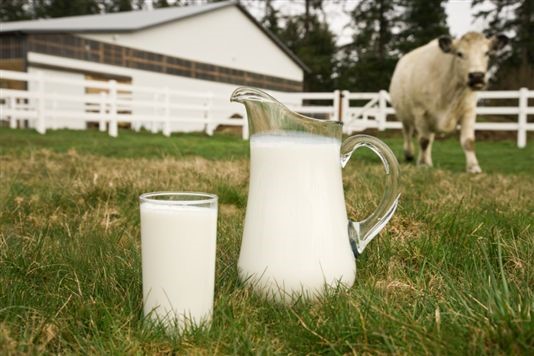Why organic milk is the only milk I drink

Alessia Horwich explains why she's prepared to pay a little extra for organic milk.
As someone in their twenties, eating organic isn’t always within my price range. But there is one product I will always pay more for and that’s organic milk. The reasons are simple and not just about me. In fact, it’s mostly about the cows.
Better for you
Selfish reasons first - what I do get from organic milk is more nutrients. It's higher in vitamin E and A and in Omega 3 than conventional milk. A recent report by the European Commission showed that organic milk also has much lower levels of harmful saturated fats (30-50% less) and more of the good fatty acids than contained in normal milk. I also think it’s much more lip-smackingly creamy and nicer to drink.
Perhaps part of why it tastes so good is the self-satisfaction that I’m doing the right thing, because the plain facts are that organic dairy cows have a better deal than conventional dairy cows.
Where they live
For conventional dairy cows, times are permanently tough. Removed from their mothers almost immediately after birth, distressing both mum and baby, calves are kept isolated in individual pens. They are usually fed on reconstituted powdered milk to get the nutrients they need.
For organic cows, things are a bit better. They stay with their mothers for longer at the start and are then kept in a group of calves which continues to feed from a nurse cow at least half of the time, until they are weaned.
Once they are grown, a conventional dairy cow may spend its whole life standing on a concrete floor. It depends on the farm, but they can be kept inside the entire time without bedding.
Organic dairy cows are housed only during the winter, but clean and comfortable bedding is required.
Boosting production
Conventional dairy cows need to earn their keep by first producing a calf, to then produce as much milk as possible. Using hormones to increase conception rates, and make sure the herd all calf at the same time, is now widespread. This exhausts the animals, and cows that should live for 20 years are frequently culled at between 5-7 years old.
For organic cows, treatment with fertility hormones is rare and can only be used with individual animals, meaning most avoid invasive and painful procedures, even if they are still expected to produce a calf each year.
Keeping the cows healthy
Exhausted cows are weaker cows, leading to udder infections and lameness. In conventional herds, cows are routinely treated with antibiotics to prevent these problems. This is not good for the cows or their milk.
Organic herds are treated using harmless homeopathic remedies to prevent problems, and are only given antibiotics when an illness has developed. Cows being treated are taken out of the milking herd for twice as long as in conventional herds, ensuring we don’t end up consuming any residue of the medication.
What they get to eat
60% of an organic cow’s diet must be grass, silage, hay and other green plants – so all the normal stuff you’d expect a cow to eat. No chemical pesticides are used on organic farms so there’s no chance of that being passed down the food chain. If the cows are fed high protein concentrates to boost their milk production, the rules state that it cannot be genetically modified or animal in origin.
For conventional dairy cows, it’s totally different. Cows are fed grain modified to be very high in protein, so they keep pumping out that milk. There are even reports of feed including dead chickens, pigs and other animals. While this won’t be the case for the majority of British farmers, it’s clear that better fed cows are healthier and produce better milk.
The future
There isn’t much I can do about the suffering of dairy cows. The future of intensive milking is big, if last year's proposals for a new mega dairy farm in Leicestershire housing almost 4,000 cows indoors, each producing 70 pints of milk a day, are anything to go by. (The plans have since been withdrawn due to protests, but could be resubmitted.)
But by drinking organic, I can take myself out of this food chain, so none of it is being produced on my behalf. Now the cows are going through all that for others, and if you drink conventional milk, that means you. How do you feel about that?
Also worth your attention:
Comments
Do you want to comment on this article? You need to be signed in for this feature